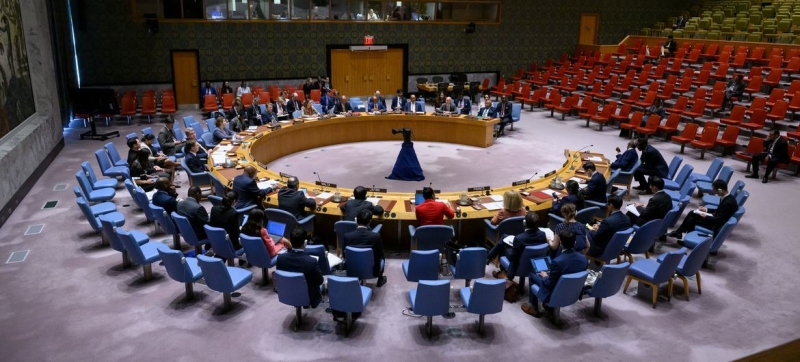
Meeting of the UN Security Council. Photo from the archive Shelling of Tel Aviv: the situation in the Middle East was discussed at an emergency meeting of the Security Council Peace and Security
On July 19, an unmanned aerial vehicle (UAV) struck a residential building in the densely populated center of Tel Aviv. One Israeli civilian was killed by shrapnel and ten others were injured. UN Deputy Secretary-General for Political Affairs Rosemary DiCarlo reported this to members of the UN Security Council during an emergency meeting convened at the initiative of France, Great Britain and the United States.
The Houthis have declared Tel Aviv a target
The Houthis in Yemen have claimed responsibility for the attack, calling it “retribution,” DiCarlo said. for the war between Israel and Hamas in Gaza. The Houthis announced the launch of a new drone called Yafa, and also said that Tel Aviv will now be their main target.
The Israel Defense Forces (IDF), according to the reporter, identified the UAV as a modified Iranian Samad-3 drone launched from Yemen. The Israeli military claims that during the same period of time they managed to intercept another UAV launched from this country.
UN Secretary General condemned the shelling of Israel
The UN Secretary-General, as his deputy recalled, condemned this deadly attack two days ago. He remains deeply concerned about the threat that such actions pose to further escalation in the region. Tensions have only increased over the past two days, she stressed.
Strikes on Hodeida
On July 20, Israel carried out several airstrikes on the Yemeni port of Hodeidah and its surrounding area. An Israeli army spokesman described the strikes as “necessary and proportionate.” He said the Houthis were using the port as a main route for Iranian arms shipments from Iran to Yemen. Israel, and Israeli civilians and infrastructure have been attacked more than two hundred times over the past nine months,” DiCarlo said.
“A Houthi military spokesman described the strikes as “brutal aggression against Yemen,” said the Houthis would respond to “this blatant aggression,” and threatened to strike “vital targets of the Israeli enemy,” the speaker continued.
The strikes killed nine people, injured more than 80, and caused significant damage to civilian infrastructure, she said, citing the Houthi de facto Health Ministry.
The UN cannot confirm these data, DiCarlo added. All UN staff in Hodeidah are safe.
The port of Hodeidah is a lifeline for millions of people in Yemen, the speaker noted. Through it, food, medicine and fuel enter the country.
“It is important that the port is open and working. In addition, the port is located in a densely populated urban center where thousands of people live. Any military campaign in its vicinity risks having devastating consequences for the civilian population,” she warned.
Read also:
UN: escalation on the Blue Line can and should be avoided
Aggravation in Lebanon and Syria
Meanwhile, firefights continue across the Blue Line. According to unconfirmed media reports, the Israel Defense Forces struck a Hezbollah ammunition depot and vehicle in Lebanon, injuring people and damaging civilian infrastructure.
Last This week, Israel, according to the Syrian government, carried out strikes on military targets in southern Syria and a residential area in Damascus. Israel said this was in response to the launch of two drones from Syria.
DiCarlo cited other examples of escalation in the region, recalling that the Secretary-General warned in his June 21 statement that “the danger of expanding conflict in the Middle East is real and must be avoided.”
